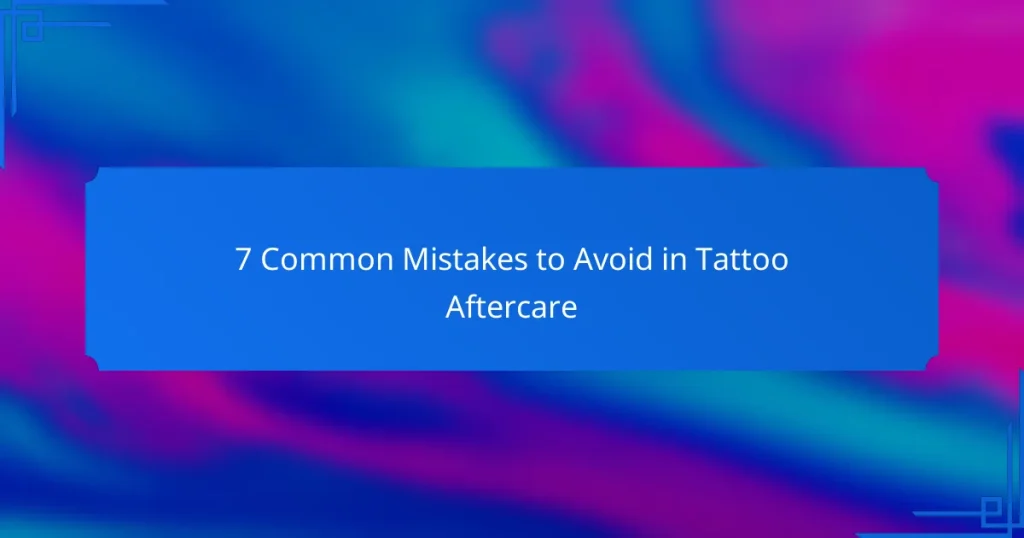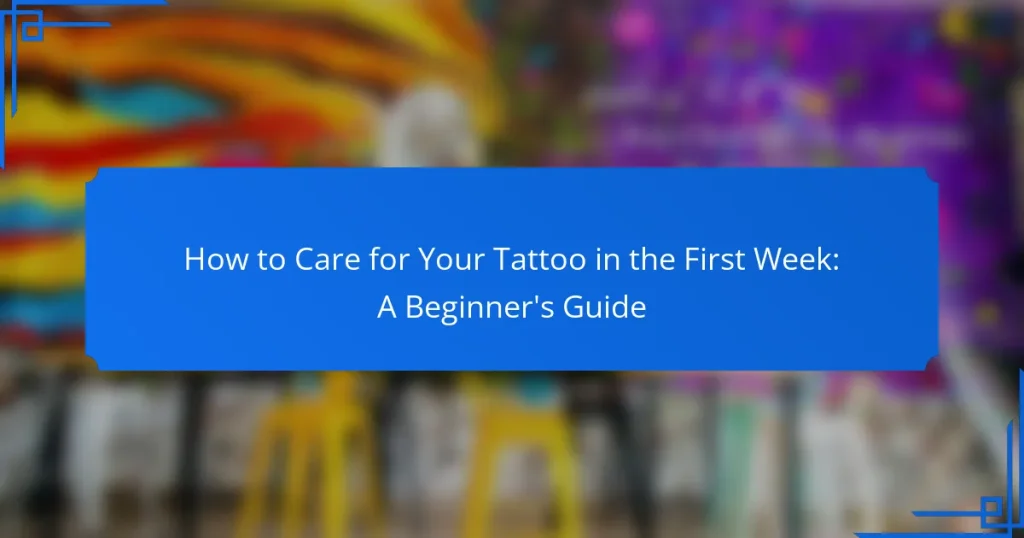Proper tattoo aftercare is crucial for maintaining the integrity and appearance of your new ink. By focusing on cleanliness, hydration, and protection, you can help ensure a smooth healing process while preventing infections. Utilizing the right products and following recommended steps will keep your tattoo looking vibrant for years to come.
How to Care for Your Tattoo in the First Week: A Beginner’s Guide
7 Signs Your Tattoo is Healing Properly: What Beginners Should Know
7 Essential Aftercare Tips for Your First Tattoo
Choosing the Right Aftercare Products for Your Tattoo
How to Protect Your Tattoo While Swimming: Tips for Beginners
7 Aftercare Myths Every Beginner Should Stop Believing
What Are the Best Tattoo Aftercare Tips?
The best tattoo aftercare tips focus on maintaining cleanliness, hydration, and protection to ensure proper healing. Following these guidelines can help prevent infections and preserve the quality of your tattoo.
Keep the tattoo clean
Keeping your tattoo clean is essential for preventing infection. Gently wash the area with mild, fragrance-free soap and lukewarm water at least twice a day during the healing process.
After washing, pat the tattoo dry with a clean towel instead of rubbing it. This helps avoid irritation while ensuring that the area remains free from bacteria.
Moisturize regularly
Regular moisturizing is crucial for keeping your tattoo hydrated and preventing scabbing. Use a fragrance-free, non-comedogenic lotion or a specialized tattoo aftercare ointment.
Apply a thin layer of moisturizer 2-3 times a day, especially after washing. Avoid over-moisturizing, as this can lead to clogged pores and delayed healing.
Avoid sun exposure
Sun exposure can fade your tattoo and damage the skin during the healing process. Keep your tattoo covered with clothing or a bandage when outdoors, especially in the first few weeks.
Once healed, use a high-SPF sunscreen to protect your tattoo from UV rays. This will help maintain its vibrancy and prevent skin damage.
Do not pick or scratch
It’s important to resist the urge to pick or scratch your tattoo, as this can lead to scarring and infection. Allow any scabs to fall off naturally to ensure proper healing.
If itching occurs, gently tap or apply a cool compress to the area instead of scratching. This will help alleviate discomfort without damaging the tattoo.
Wear loose clothing
Wearing loose clothing over your tattoo can help prevent irritation and allow the skin to breathe. Tight clothing may rub against the tattoo, causing discomfort and potentially affecting the healing process.
Opt for breathable fabrics, especially in the first few weeks, to promote healing and comfort. Avoid materials that may trap moisture or heat against the skin.
How to Clean a New Tattoo?
Cleaning a new tattoo is essential for preventing infection and ensuring proper healing. Follow these steps to keep your tattoo clean and healthy during the initial healing phase.
Use mild soap and water
When cleaning your new tattoo, use a mild, fragrance-free soap to avoid irritation. Gently lather the soap in your hands and apply it to the tattooed area with light pressure, ensuring you remove any excess ink, blood, or ointment.
Rinse the tattoo thoroughly with lukewarm water. Avoid using hot or cold water, as extreme temperatures can irritate the skin and affect healing.
Pat dry with a clean towel
After rinsing, gently pat the tattoo dry with a clean, soft towel. Do not rub the area, as this can cause irritation or damage to the healing skin.
It’s best to use a towel that is freshly laundered to minimize the risk of bacteria. Allow the tattoo to air dry for a few minutes before applying any ointment.
Apply a thin layer of ointment
Once the tattoo is dry, apply a thin layer of a recommended ointment, such as Aquaphor or a tattoo-specific aftercare product. This helps to keep the tattoo moisturized and aids in the healing process.
Be careful not to over-apply; a small amount is sufficient. Reapply the ointment 2-3 times a day for the first week, or as directed by your tattoo artist, to promote optimal healing.
What Products Are Recommended for Tattoo Aftercare?
For effective tattoo aftercare, it’s essential to use products that promote healing and protect the tattoo. Recommended items include fragrance-free lotions, healing ointments like Aquaphor, and sunblock specifically designed for tattoos.
Fragrance-free lotion
Fragrance-free lotion is crucial for tattoo aftercare as it hydrates the skin without irritating it. Look for lotions that are hypoallergenic and designed for sensitive skin to avoid adverse reactions.
Apply a thin layer of lotion to your tattoo several times a day, especially after washing. This helps maintain moisture and supports the healing process while preventing scabbing.
Healing ointment like Aquaphor
Healing ointments, such as Aquaphor, create a protective barrier over the tattoo, which is beneficial during the initial healing phase. These ointments help lock in moisture and prevent bacteria from entering the wound.
Use a small amount of ointment for the first few days after getting your tattoo, applying it 2-3 times daily. Be cautious not to overapply, as this can suffocate the skin and lead to irritation.
Sunblock for tattoos
Sunblock is essential for protecting your tattoo from UV rays, which can fade colors and damage the skin. Use a broad-spectrum sunscreen with an SPF of at least 30 once your tattoo has fully healed.
Apply sunblock generously to your tattoo whenever you are exposed to sunlight, especially during the first few months. Reapply every two hours if you are swimming or sweating to ensure maximum protection.
How Long Should You Care for a New Tattoo?
You should care for a new tattoo for at least two weeks, focusing on proper hygiene and moisture to ensure optimal healing. After this initial period, long-term care becomes essential to maintain the tattoo’s appearance and skin health.
Initial care for 2 weeks
During the first two weeks, keep the tattoo clean and moisturized. Wash it gently with mild soap and water, pat it dry, and apply a thin layer of fragrance-free moisturizer or a specialized tattoo aftercare ointment.
Avoid soaking the tattoo in water, such as in baths or swimming pools, as this can lead to infection. Additionally, refrain from exposing the tattoo to direct sunlight, which can fade the ink and hinder healing.
Long-term care for life
Long-term care for your tattoo involves protecting it from sun exposure and keeping the skin hydrated. Use a broad-spectrum sunscreen with a high SPF when outdoors to prevent fading and skin damage.
Regularly moisturize the tattooed area to keep the skin healthy and vibrant. Consider using products specifically designed for tattoo care to enhance the longevity of the ink.
What Are Common Mistakes in Tattoo Aftercare?
Common mistakes in tattoo aftercare can lead to complications such as infections, fading, or poor healing. Understanding these errors helps ensure your tattoo heals properly and maintains its quality.
Ignoring aftercare instructions
Ignoring aftercare instructions provided by your tattoo artist is one of the most significant mistakes. These guidelines are tailored to your specific tattoo and skin type, and neglecting them can result in improper healing.
Follow the recommended aftercare routine closely, which typically includes keeping the tattoo clean and moisturized. Skipping steps can lead to complications like scabbing or color loss.
Using harsh chemicals
Using harsh chemicals on a new tattoo can irritate the skin and hinder the healing process. Products containing alcohol, fragrances, or strong exfoliants should be avoided during the healing phase.
Instead, opt for gentle, fragrance-free cleansers and moisturizers. Look for products specifically designed for tattoo aftercare to ensure they are safe and effective.
Excessive exposure to water
Excessive exposure to water, especially in pools, hot tubs, or long baths, can damage a healing tattoo. Prolonged soaking can lead to color loss and increase the risk of infection.
Limit water exposure for at least two weeks after getting your tattoo. Quick showers are acceptable, but avoid submerging the tattoo in water until it is fully healed.
How Does Climate Affect Tattoo Healing?
Climate plays a significant role in tattoo healing, influencing factors such as moisture levels and temperature. High humidity can create an environment that slows down the healing process, while dry conditions may lead to quicker recovery but can also cause skin irritation.
Humidity can slow healing
High humidity can hinder the healing of a new tattoo by trapping moisture against the skin, which may lead to prolonged scabbing and increased risk of infection. When the skin remains wet for extended periods, it can become overly soft, making it difficult for the tattoo to set properly.
To manage humidity, consider wearing loose-fitting clothing over the tattoo to allow airflow. If you live in a humid area, avoid soaking the tattoo in water, such as in baths or swimming pools, for at least two weeks. Instead, opt for quick showers and gently pat the area dry.
Additionally, using a breathable, fragrance-free moisturizer can help maintain skin hydration without overwhelming the tattoo. Look for products that are specifically designed for tattoo aftercare to ensure they are safe and effective.






